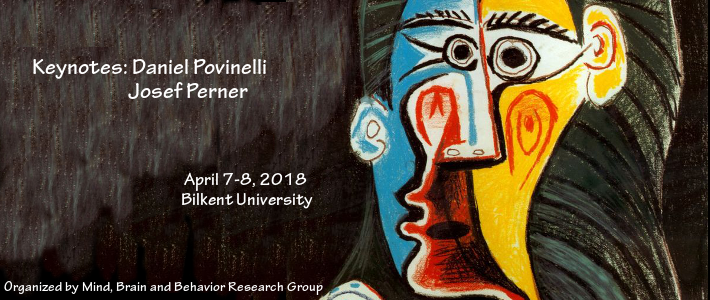
Social Cognition is an expanding field of study that has come to include researchers from Philosophy, Psychology, Neuroscience, and Robotics. Social Cognition is focused on describing and explaining how human, non-human, and artificial systems understand sociality. Theoretical debates in philosophy consider issues of origins and ontology, in psychology, qualitative and quantitative methods are used to establish developmental, cross-cultural, and comparative patterns in different sorts of social performances, while neuroscience considers any neurologically relevant contribution to such abilities. Finally, roboticists have begun to explore how to create social agents capable of robust forms of human interaction. This interdisciplinary conference will explore some of the new ideas in the study of social cognition.
Dates: April 7-8, 2018
Location: Bilkent University, Main Campus, FFB Building (Click here for Google Maps)
Mandatory Registration: Attendance is free for all graduate students, post-docs, independent researchers and faculty, but registration is required. Registration for the conference is closed.
Call for Poster Presentations: Submissions are now closed.
Host departments: Philosophy, Psychology, Neuroscience, Bilkent University
Organizers: Jedediah WP Allen, Hande Ilgaz, Nazim Keven (Mind, Brain and Behavior Research Group, Bilkent)
Contact Email: socialcognition[at]bilkent[dot]edu[dot]tr
Conference program: Click here Conference poster: Click here
Travel Information: Click here Campus Map
Photos: Click here
Keynote speakers:
JOSEF PERNER received his PhD in Psychology from the University of Toronto. He was Professor in Experimental Psychology at the University of Sussex and is now Professor of Psychology and member of the Centre for Neurocognitive Research at the University of Salzburg. He is author of “Understanding the Representational Mind” (MIT Press, 1991) and over 180 articles on cognitive development (theory of mind, executive control, episodic memory, logical reasoning), consciousness (perception versus action), simulation in decision making, and theoretical issues of mental representation and consciousness. He served as President of the European Society for Philosophy and Psychology, is a Fellow of the British Academy, the Academia Europaea, the Leopoldina, the Center for Advanced Studies in the Behavioral Sciences at Stanford, the Association for Psychological Sciences, holds an honorary doctorate from the University of Basel, and was awarded the William Thierry Preyer Award for Excellence in Research on Human Development by the European Society of Developmental Psychology (ESDP) and the Bielefelder Wissenschaftspreis for the interdisciplinary nature of his research.
DANIEL J. POVINELLI is Professor of Biology at the University of Louisiana at Lafayette. His primary interests have centered on the characterization of higher-order cognitive functions in great apes and humans. He is the recipient of a National Science Presidential Young Investigator Award, the American Psychological Association’s Distinguished Award for an Early Career Contribution to Psychology, and a one million dollar James S. McDonnell Foundation Centennial Fellow prize. He is the author of 3 books and over 130 scientific papers. His research has been featured on numerous news outlets including CBS News, ABC News, Public Radio International, BBC TV and radio, PBS, as well as in several documentaries, including Martin Scorese’s Surviving Progress, Morgan Freeman’s Through the Wormhole, Alan Alda’s The Human Spark, National Geographic’s Human Ape and Animal Minds, BBC/Nature’s The Monkey in the Mirror, and Dutch Public Broadcast, And Apes Became Men. He continues to conduct research and publish in areas related to animal cognition, Autistic Spectrum Disorders, and the philosophy of agency.
Invited speakers:
JEDEDIAH WP ALLEN is an assistant professor of Psychology and co-director of the BIL-GE developmental lab at Bilkent University. He is an associated editor for New Ideas in Psychology and recently received a national grant. He pursues theoretical and empirical issues within the area of Developmental Cognitive Science with a focus on nature of representation, learning, and development across the domains of social-cognitive and cognitive development. Specific areas of research and publication include: (over)-imitation,development of trust and deception, theory of mind development, infant research methodology, the nativist-empiricist debate, and the role of action-based frameworks for the study of developmental psychology.
KRISTIN ANDREWS is York Research Chair in Animal Minds and Associate Professor of Philosophy at York University (Toronto), where she also helps coordinate the Cognitive Science program and the Toronto Area Animal Cognition Discussion Group. She is on the board of directors of the Borneo Orangutan Society Canada, a member of the College of the Royal Society of Canada, and the author of a book on normative folk psychology (Do Chimpanzees Read Minds? Toward a New Folk Psychology MIT 2012) and a book on animal minds (The Animal Mind, Routledge 2015). She has published articles on the evolution of morality, pluralistic and normative nature of human folk psychology, the varieties of self understanding, chimpanzee mindreading, animal belief, normativity in nonhuman animals, the methodology of animal cognition research, and on the ethical implications of the cognitive, cultural, social, and emotional lives of other animals.
MARCO FENICI is a research fellow at Bilkent University. He completed his MA in Philosophy and Logics at the University of Florence in 2005, and his PhD in Philosophy and Cognitive Sciences at the University of Siena in 2011. In his career, he has been Research Fellow at the University of Florence, and visiting fellow at the University of Massachusetts, Amherst (USA), the University of Hertfordshire (UK), and the Rühr Universität Bochum (DE). His research focuses on the development of social cognition in infancy and early childhood. He is also interested in the nature and function of folk psychology, embodied and extended cognition, and the philosophy of human sciences. His work is published in Mind & Language, the Journal of Cultural Cognitive Science, Philosophical Psychology, and Phenomenology and the Cognitive Sciences.
HANDE ILGAZ completed her PhD in 2011 from Lehigh University in Psychology with a concentration in child development. Her dissertation focused on children’s perspective taking abilities as reflected in their story comprehension and story production. In 2011, Hande joined Temple University’s Infant and Child Lab as a postdoctoral research fellow and project coordinator for a multi-site, IES funded study. This study investigated the effectiveness of different bookreading and play strategies to teach vocabulary to children from low-SES backgrounds. Hande joined the psychology department at Bilkent University as an assistant professor in 2013. Her research investigates children’s cognitive (language, executive functions) and social-cognitive development (perspective-taking, theory of mind) through a socio-cultural framework. She is primarily interested in the effects of interactions in natural contexts (pretend play, shared bookreading) on child outcomes. Her work has appeared in Mind, Culture and Activity, American Journal of Play, Early Childhood Research Quarterly and Cognitive Development, as well as edited books and encyclopedias.
BAHAR KÖYMEN is a lecturer at University of Manchester. She completed her PhD at University of California, Santa Barbara and she was a post-doctoral Researcher at Max Planck Institute for Evolutionary Anthropology. Her research focuses on the intersection between children’s communicative and socio-cognitive development. Dr. Koymen investigates the ways in which young children’s social and cognitive abilities are manifested in interactive contexts, particularly in their peer interactions. Her work is published in a number of journals, including Child Development, Developmental Psychology, Journal of Experimental Child Psychology, British Journal of Developmental Psychology.
RAYMOND MAR is an associate professor at York University. His research group study the psychology of narratives and its relation to the development of social cognition (e.g. empathy). Dr. Mar uses an interdisciplinary approach combining neuroscience, social, developmental, and personality psychology. His work has been published in several top tier journals, and he has collaborated with an influential group of researchers (e.g., Keith Oatley, Joan Peskin) in the Toronto region. Research by Dr. Mar and his collaborators has significantly influenced how we understand the relationship between narratives and the development of empathy and social cognition.
Conference sponsored by:
With additional support from:


